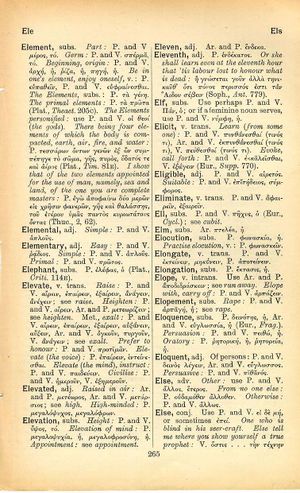else: Difference between revisions
m (Text replacement - " . . ." to "…") |
m (Woodhouse1 replacement) |
||
| Line 1: | Line 1: | ||
{{Woodhouse1 | {{Woodhouse1 | ||
|Text=[[File:woodhouse_265.jpg|thumb|link={{filepath:woodhouse_265.jpg}}]] | |Text=[[File:woodhouse_265.jpg|thumb|link={{filepath:woodhouse_265.jpg}}]] | ||
===adverb=== | |||
[[other]]: use [[prose|P.]] and [[verse|V.]] [[ἄλλος]], [[ἕτερος]]. | |||
Use P. and V. εἰ δὲ μή, or | [[from no one else]]: [[prose|P.]] [[οὐδαμόθεν ἄλλοθεν]]. | ||
[[otherwise]]: [[prose|P.]] and [[verse|V.]] [[ἄλλως]]. | |||
===conjunction=== | |||
HEC. | Use [[prose|P.]] and [[verse|V.]] εἰ δὲ μή, or [[sometimes ἐπεί]]. | ||
POLY. | |||
ἙΚ. | [[one who is blind in his seer-craft]]. | ||
ΠΟΛΥ. | |||
[[else tell me where you show yourself a true prophet]]: [[verse|V.]] [[ὅστις… τὴν τέχνην ἔφυ τυφλός. ἐπεὶ, φέρ' εἰπέ, ποῦ σὺ μάντις εἶ σαφής]] ([[Sophocles|Soph.]], ''[[Oedipus Rex]]'' 389). | |||
[[this seems to me to be the case with this man, else how is it just]]? [[prose|P.]] [[ὅπερ καὶ οὗτος ἐμοί γε δοκεῖ πάσχειν· ἐπεὶ, φέρε, πῶς ἐστι δίκαιον]]; ([[Demosthenes|Dem.]] 879). | |||
[[you had no better advice to offer]], [[else they would not have followcd mine]]: [[prose|P.]] σὺ [[οὐχ ἕτερα εἶπες βελτίω τούτων]]· [[οὐ γὰρ τούτοις ἂν ἐχρῶντο]] ([[Demosthenes|Dem.]] 294). | |||
I love my own [[children]], else were I [[mad]]: φιλῶ ἐμαυτοῦ τέκνα· μαινοίμην γὰρ ἄν ([[Euripides|Eur.]], ''[[Iphigenia in Aulis]]'' 1256). | |||
HEC. Did not (the god) prophesy to you any of the woes you now endure? | |||
POLY. No. Else you would not have trapped me thus by stratagem. | |||
ἙΚ. Σοὶ δ' οὐκ ἔχρησεν οὐδὲν ὧν ἔχεις πόνων; | |||
ΠΟΛΥ. Οὐ γάρ ποτ' ἂν σύ μ' εἷλες ὧδε σὺν δόλῳ.([[Euripides|Eur.]], ''[[Hecuba]]'' 1268). | |||
}} | }} | ||
Revision as of 08:50, 20 May 2020
English > Greek (Woodhouse)
adverb
other: use P. and V. ἄλλος, ἕτερος.
from no one else: P. οὐδαμόθεν ἄλλοθεν.
conjunction
Use P. and V. εἰ δὲ μή, or sometimes ἐπεί.
one who is blind in his seer-craft.
else tell me where you show yourself a true prophet: V. ὅστις… τὴν τέχνην ἔφυ τυφλός. ἐπεὶ, φέρ' εἰπέ, ποῦ σὺ μάντις εἶ σαφής (Soph., Oedipus Rex 389).
this seems to me to be the case with this man, else how is it just? P. ὅπερ καὶ οὗτος ἐμοί γε δοκεῖ πάσχειν· ἐπεὶ, φέρε, πῶς ἐστι δίκαιον; (Dem. 879).
you had no better advice to offer, else they would not have followcd mine: P. σὺ οὐχ ἕτερα εἶπες βελτίω τούτων· οὐ γὰρ τούτοις ἂν ἐχρῶντο (Dem. 294).
I love my own children, else were I mad: φιλῶ ἐμαυτοῦ τέκνα· μαινοίμην γὰρ ἄν (Eur., Iphigenia in Aulis 1256).
HEC. Did not (the god) prophesy to you any of the woes you now endure?
POLY. No. Else you would not have trapped me thus by stratagem.
ἙΚ. Σοὶ δ' οὐκ ἔχρησεν οὐδὲν ὧν ἔχεις πόνων;
ΠΟΛΥ. Οὐ γάρ ποτ' ἂν σύ μ' εἷλες ὧδε σὺν δόλῳ.(Eur., Hecuba 1268).

